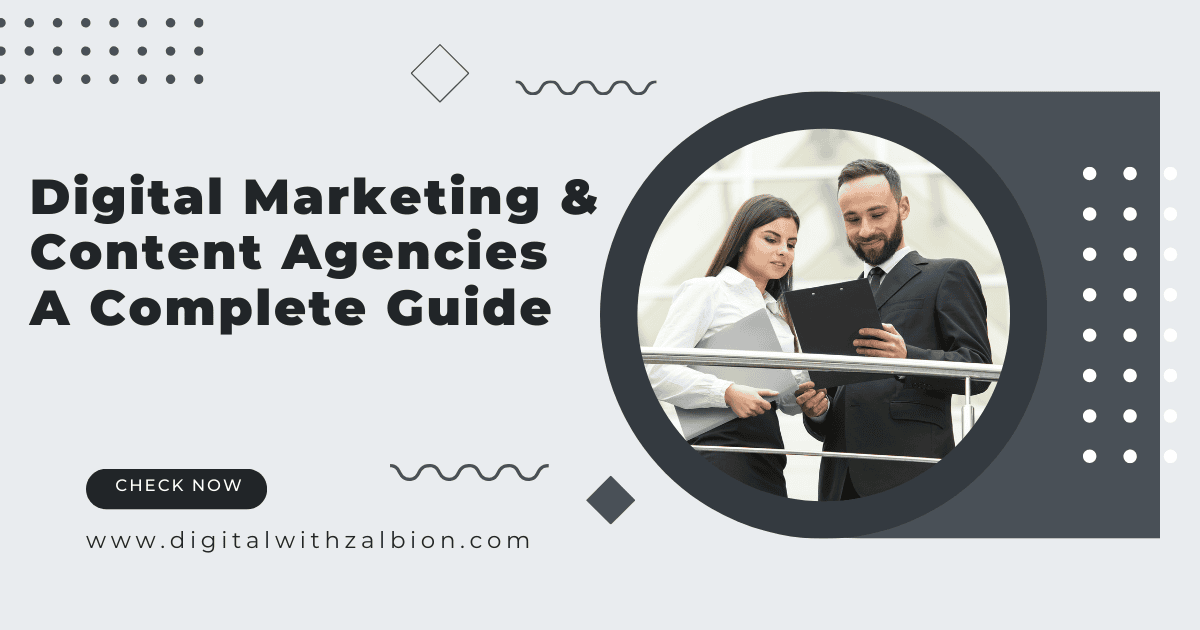Introduction
With today’s business world and global integration, online presence is no longer an option but a necessity for any business. As the world is focused on digital transformation, the need for effective strategies has gained much importance and needs to be implemented by companies. Digital and online marketing strategies are enough to confuse many with their nuances and agencies’ roles. This guide talks about the basics of digital marketing, why businesses will require collaboration with specialized digital and content agencies, and how companies can take advantage of online marketing to grow and succeed.
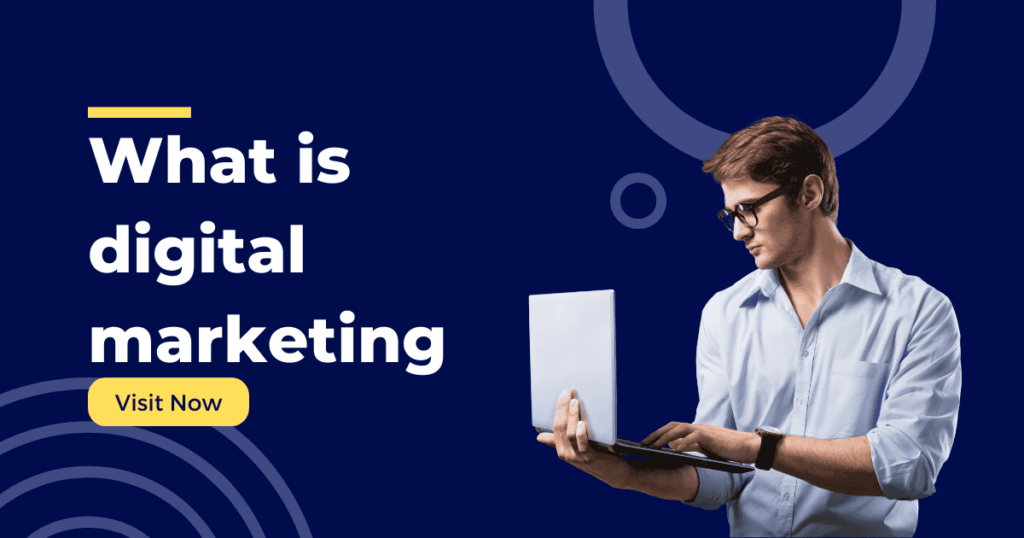
1. What is Digital Marketing?
Definition of Digital Marketing
Marketing is the method of marketing that uses all the online and digital-based technologies to advertise a product or service. Some of the different strategies included in marketing include SEO, social media marketing, content marketing, email marketing, as well as PPC advertisement.
This shows that marketing differs from traditional marketing in the way it reaches an extremely large audience, that is worldwide cost-effectively and measurably. For example, through SEO your website increases visibility on search engines, thus attracting organic traffic. Conversely, PPC ads account for instant outcomes and display targeted ads to the targeted audience. Social media marketing engages users on platforms like Facebook and Instagram, thereby increasing brand awareness and customer loyalty.
Advanced tracking and analytics enable measurement of the performance of the campaign in real-time and adjustment of the strategies for better results. This approach provides more accurate targeting, personal experience, and ROI.
Overall, marketing is important for businesses looking to thrive in today’s digital-first world. Flexibility and scalability also equate to powerful growth opportunities.
Key Digital Marketing Ingredients
- SEO denotes Search Engine Optimization: Improving your website’s position on SERPs. Keyword research and On-page SEO such as meta tags and content optimization. On the flip side, Off-page SEO refers to backlinks. Briefly, it’s the art of driving organic traffic through improving visibility. PPC:
- Pay-per-click is a paid digital advertising: method where an advertiser pays a cost for every click on their ad. It’s a way to buy visits to your site instead of receiving them organically. Popular PPC platforms include Google Ads and Bing Ads.
- Content marketing: Marketing refers to the creation of valuable and relevant content that is meant to attract and engage a targeted audience. Now, this can be in the forms of published blog posts and videos, infographics, or podcasts that solve an individual’s problems but express the brand.
- Social Media Marketing (SMM): SMM serves as a strategy for promoting your brand, products, or services using social media platforms like Facebook, Instagram, Twitter, and LinkedIn. Such a strategy is perfect for engaging customers, sharing content, and enhancing brand loyalty.
- Email Marketing: Email marketing is perhaps the most direct and the most personalized mode of digital marketing. In this practice of targeted emails to the subscribers’ list, the motive would include nurturing leads, retaining customers, and promoting products or services.
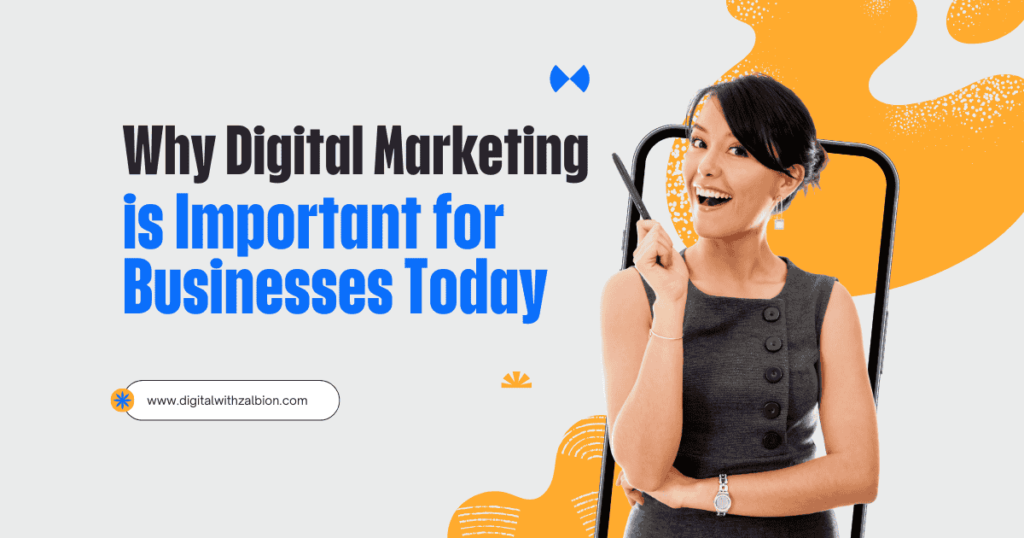
Why Digital Marketing is Important for Businesses Today
Digital marketing has a lot of advantages over traditional means:
- Global Reach: A business can reach audiences across the globe with ease and at an economical cost through digital marketing.
- Measurable Outcomes: Every digital campaign can be tracked and measured in real-time, enabling businesses to see what works and what doesn’t.
- Personalization: Marketing enables businesses to personalize messages to target audiences by demographics, behaviors, and interests.
- Greater Engagement: Interactive forms of marketing like social media enable enterprises to interact directly with customers, resulting in a higher level of loyalty towards the brand.
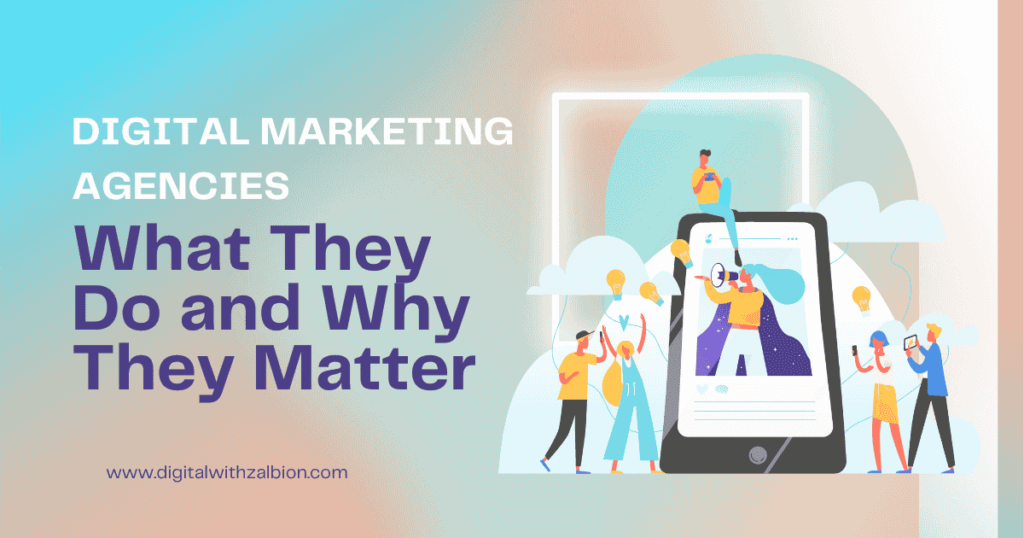
2. Digital Marketing Agencies: What They Do and Why They Matter
Definition of a Digital Marketing Agency
A digital marketing agency is simply a company that offers full online marketing services to businesses to increase their presence and engagement via the internet. These agencies engage in a variety of different marketing fields, applying all the latest technologies and strategies to help businesses achieve their marketing goals.
Services Offered by Digital Marketing Agencies
- Search Engine Optimization (SEO): Agencies refine your website to rank high in Google or Bing and so grow your organic traffic.
- Search Engine Marketing (SEM): SEM involves paid search campaigns such as Google Ads. Agencies will handle your ad’s PPC so that you get a good ROI.
- Content Development and Marketing: Agencies would develop quality blogs, infographics, videos, etc. with other formats of content to attract and engage your audience and thereby help enhance your SEO.
- Social Media Management: From creating content to managing all the social media profiles, agencies help build a strong presence on platforms such as Instagram, LinkedIn, and Twitter.
- Email Marketing Campaigns: A good agency will create and customize email campaigns for you, keeping your leads warm and turning them into customers.
- Analytics and Reporting: Digital agencies provide in-depth reports showing the performance of campaigns and recommending optimizations.
How to Select the Best Digital Marketing Agency
- Portfolio & Case Studies: View the agency’s portfolio and see if they did well in your industry.
- Industry Experience: Ensure they know your niche as well as your audience, to design campaigns targeted to your target market
- Client Testimonials: Get reviews or ask for references to measure the level of satisfaction from clients
- Pricing Models: Know whether the agency will charge you a flat fee, or an hourly rate, whether it uses a project-based pricing model, and if it falls within your budget.
Advantages of Digital Marketing Agency
- Expertise: Agencies have an in-house team of skilled professionals who have been trained in various areas of marketing.
- Time Savings: You shall be able to have enough time for your core business operations when you outsource your marketing services.
- Levitation of Advanced Tools: Agencies are well-provided with marketing tools to be used for automation, data analysis, as well as campaign management.
- Measurable Results: Agencies give clear KPIs and performance reports to measure the success of the campaign.

3. The Emergence of Content Marketing Agencies
What is Content Marketing?
Marketing is any activity that has the objective of directly accelerating sales without ever asking readers for money; it aims to attract and retain, on behalf of the business, an audience and followers who are fully aware of the brand’s message and goods/-services and drive profitable customer action over time. Unlike paid advertisements, marketing does not push readers toward a brand but introduces the reader to a subject matter that meets their needs and makes them have long-term trust in that brand.
Why Content Marketing Agencies are Rising to Prominence
Content is one of the most significant tools when it comes to reaching a target audience. The demand is exponentially increasing because consumers do not believe in a lot of traditional advertisements, as they generally want content that might inspire, educate, or entertain them. It is through content agencies that brands ensure the production of quality content suitable to satisfy and solve the needs of their desired audience.
Core Content Marketing Agency Services
- Content Strategy Consulting: This is the process where an agency collaborates with a business to create a long-term strategy including the themes and content to be created, posting schedules, and channels of communication.
- Blog Writing & Content Production: Agencies will create blog posts, articles, videos, infographics, and much more, designed to maintain your audience’s interest and optimize your SEO.
- Search Engine Optimization (SEO): Content companies refine their content so that it ranks higher on the search engines, thus driving organic traffic.
- Influencer Marketing: These agencies provide influencer marketing opportunities by collaborating with the influencers in the distribution of content and establishing brand awareness.
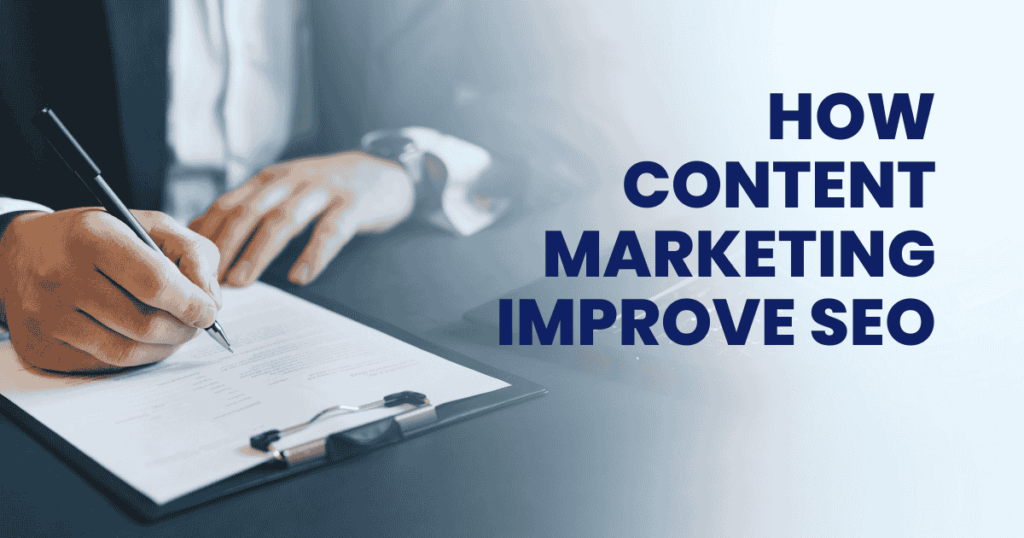
How Content Marketing Improves SEO
This increases SEO because quality, keyword-rich content attracts both search engines and users. You post good-quality content regularly-blogging videos or infographics-and thereby enhance the relevance and authority of your website with the search engine, probably Google. This tends to lead to a better rank and organic traffic.
One of the biggest ways that marketing can help improve search engine optimization is through keyword optimization: you insert target keywords inside your text, but in a natural way, so that the search engines can better understand the context of your pages and rank you more easily for those searched terms. If the content answers the query directly, it promotes dwell time: the more people spend time on your site, the more signal it gives to the search engines that your content is valuable.
Marketing also promotes backlinks from authority sites. Whenever other websites use your content, their linking happen to boost your domain authority, further improving your SEO performance. In addition, the fresh updated content depicts that your website is active and reliable.
Lastly, in marketing, the material is of importance, interest, and value to users. Whereby a proper, well-structured content strategy leads to organic traffic, it will later help decrease the bounce rate and increase the trust factor of your content with your visitors, which increases your SEO in the long run.
With this integration of marketing into a proper SEO campaign, one can see an increase in their search visibility, continual traffic, and growth and establish a good online presence.
Table of Contents
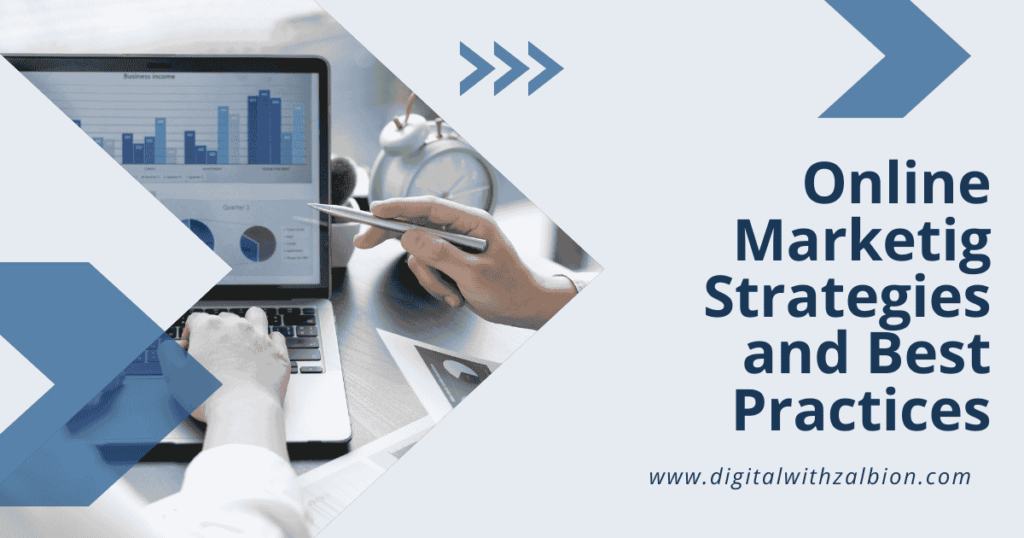
4. Online Marketing: Strategies and Best Practices
What is Online Marketing?
Online marketing, also referred to as marketing, is a method of marketing products or services online by employing a number of tools and methods. The ultimate goal is to connect with an interested online audience, which spends most of its time online. Among the various strategies in online marketing, there are some of the popular ones, such as search engine optimization, social media marketing, email marketing, content marketing, and PPC.
SEO makes sure that the ranking of a website in the search results is made the best, which will enhance organic traffic. Businesses would do optimizations through keywords, high-quality content, and technical adjustments just to make their websites more discoverable. PPC advertising, on the other hand, asks the cost of ads that should appear atop of results or on the social network for it to attract traffic directly.
Social media marketing will empower a business to reach its target directly on Facebook, Instagram, and LinkedIn, while marketing is about the marketing of valuable content – blogs, videos, etc., that attract and retain customers. Email marketing still is a good tool for nurturing relationships and leads into actual customers by sending targeted campaigns.
It tracks campaign performance online and in real-time, thus enabling businesses to make more informed decisions based on data and to change their strategies for improved performance. marketing can reach more people than traditional marketing and can do so by less expensive means to reach would-be customers.
Today, in the digital age, marketing is a must for businesses of any size to establish brand awareness and facilitate attracting the right customers toward long-run development.
Effective Online Marketing Strategies for 2024
- Multichannel Marketing: This strategy captivates your audience through social media, email, and search. All these touchpoints help raise your reach and make it relatively simple for the customer to interact with your brand.
- Conversion Rate Optimization (CRO): This is all about optimizing your website. This simply means increasing the percentage of visitors converting to your website from desired actions, such as purchases, sign-ups, and so on. A CRO strategy focuses on landing pages, forms, and call-to-action button improvement to boost conversions.
- Retargeting & Personalization: Retargeting is showing ads to a person who has previously interacted with your brand, so you remain top-of-mind. Personalization is making your marketing messages about the consumer’s prior interactions or behavior.
- Omnichannel Marketing: Since maintaining consistency throughout all of your digital channels when the consumer accesses your website on their cell phone, tablet, or desktop computer, you would ensure consistency in brand experience.
Emerging Trends in Online Marketing
- AI and Machine Learning: AI is revolutionizing digital marketing by allowing marketers to predict user behavior, automate campaigns, and personalize marketing efforts based on data.
- Short-Form Video Content: Thanks to TikTok and Instagram Reels, short-form video content has reached unprecedented popularity. More and more businesses are finding this to be an excellent way of connecting with audiences.
- Voice Search Optimization: With users getting more accustomed to voice assistants such as Siri, Alexa, or Google Assistant, optimizing for voice search has become the hallmark of becoming successful in SEO.
- Data Privacy and GDPR Compliance: As data privacy grows into an issue, marketers need to be sure they are following all legal regulations that apply to GDPR and CCPA.

5. The Future of Digital Marketing
How Technology is Shaping the Digital Marketing Landscape
Technology remains at the heart of digital marketing’s development. From AI-driven personalization to AR experience, more and more interaction is being added to future marketing. For example, AI-powered chatbots allow brands to extend customer support around the clock while gaining precious user data to target marketing.
Role of Data and Analytics in Digital Marketing
Data is gold, therefore in digital marketing. Every single interaction that a customer has with the brand visits on the website to social media engagements can be tracked and monitored. It refines marketing strategies and delivers more personalized experiences for the customers. Predictive analytics is useful for understanding and predicting future trends and characteristics of customers and thus assists marketers in making campaigns more effective.
Why Businesses Must Adapt to Stay Relevant
A dynamic and agile business is also brought about by the changing preferences of customers, adopting new technologies and techniques used in marketing. This failure to innovate can be one sure way that a brand gets overtaken by competitors who can quickly stay ahead of the newest trends in marketing. Riding ahead on emerging trends like AI, video content, and voice search will certainly make businesses stay in their positions in the market.
Conclusion
Unlocking Business Success through Digital and Content Marketing
In conclusion, digital marketing is a fantastic resource for businesses to engage customers and gain growth, hence getting an edge over competitors. It uses the services of digital marketing and content agencies that can help one develop a strategy that maximizes awareness of the brand along with building traffic while creating further conversions. Whether a new company has just launched and needs online or a huge company with a marketing strategy, the knowledge of basic marketing elements is basic in sustaining success in the long run.

